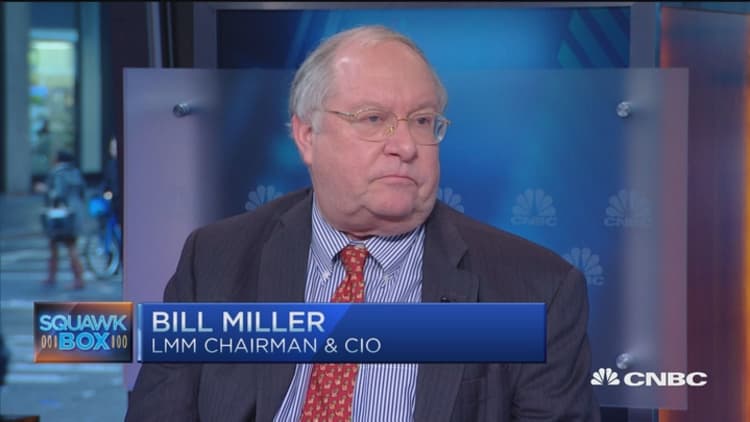


Value investor Bill Miller told CNBC on Wednesday he lost 20 percent in a month, but he thinks it's a good time to buy.
Amazon lost 18 percent in the past month and the stock is a 10 percent holding for Miller, founder, chairman, and CIO of Baltimore-based LMM. But he said it's not only Amazon. "Everything is going down."
"It took Bill Ackman and David Einhorn a year to lose 20 percent. I lost it in a month. My fund is down 20 percent in the month," Miller said on "Squawk Box," referring to the respective heads of the Pershing Square and Greenlight Capital hedge funds.
Miller, who has a strong track record, said he's been fully invested, no cash, since the 2008 financial crisis, and he's still bullish. "Lower prices mean higher future rates of return."
"The S&P [500] yields about 2.3 [percent] and dividends grew last year 9 percent," he said. "It's sort of hard to see why anyone would own a 10-year Treasury when they could own the broad market at a higher current yield."
LMM, a partially owned subsidiary of Legg Mason, has $2.1 billion of assets under management. Miller is also portfolio manager of the Legg Mason Opportunity Trust fund.
With depressed oil prices and a slowdown in China's economy, stocks logged their worst January since 2009. February has also gotten off to a volatile start — raising questions about whether the U.S. economy may go into recession.
"People think the market has some special ability to see the future. [But] the market is just people just like you and me buying and selling," said Miller. "There's disconnect between what's actually going on [economically] and what the markets are reacting to."
Take oil as an example, he said, "[historically] 85 percent of the time oil goes down, the stock market goes up. And every recession since 1970 has been at least accompanied by higher oil prices."
But in the markets now, the opposite is happening. Plunging oil prices have been driving the stock market lower, while crude gains have been pushing stocks higher.
Miller said this doesn't make any sense because "lower oil prices are unequivocally good for the U.S."


